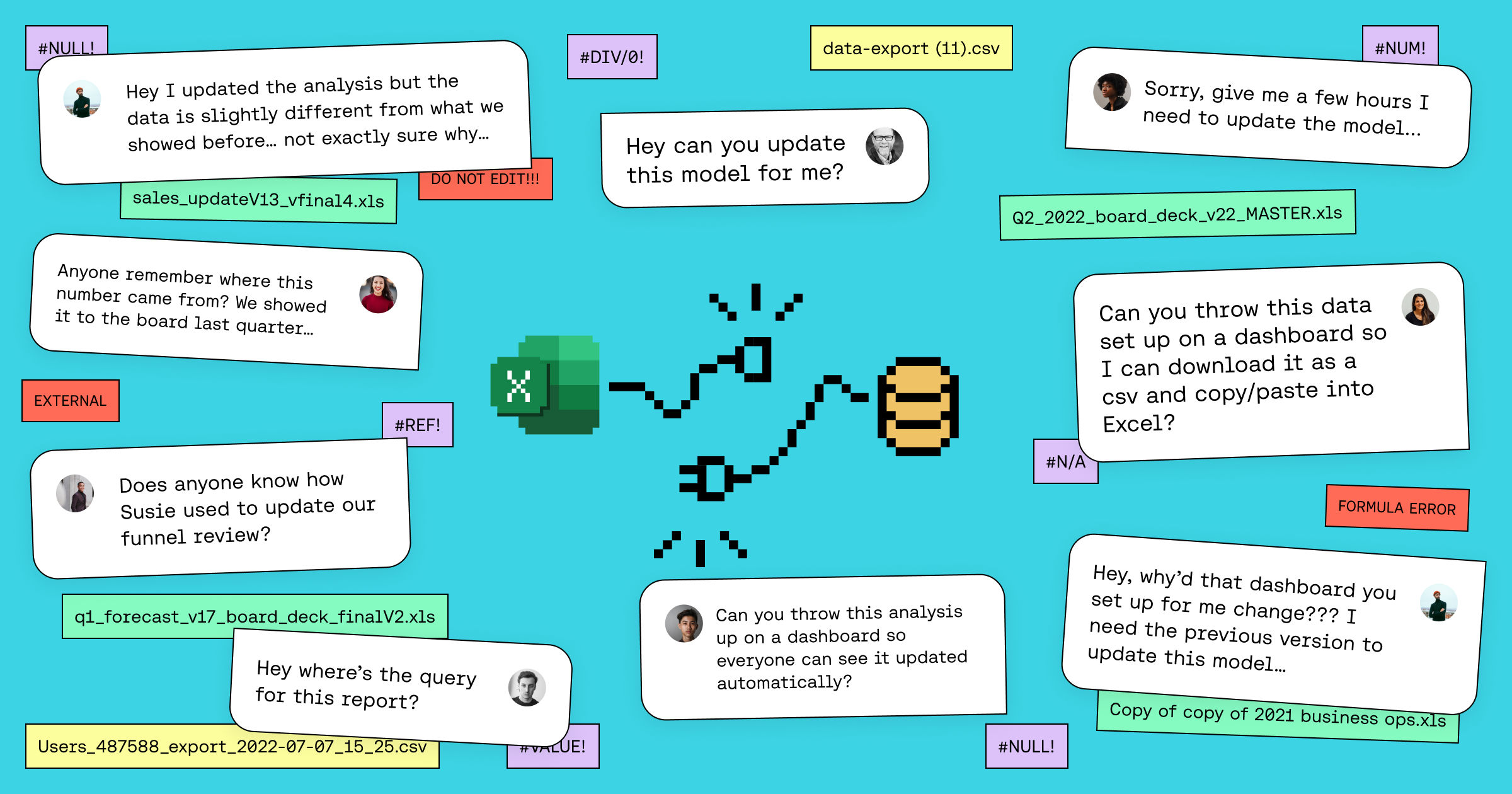Equals raises $6.6M from David Sacks at Craft Ventures to replace Excel
Bobby Pinero | | 4 min read

"Regardless of the other tools out there, spreadsheets are the best interface for working with data. We are excited about Equals because they are building a fundamentally better, more connected spreadsheet. As businesses move away from disconnected, antiquated tools like Excel, Equals has a massive opportunity to become the defacto spreadsheet." - David Sacks, General Partner at Craft Ventures
We’re proud and excited to share that Equals has raised a $6.6M seed round, led by David Sacks at Craft Ventures, with participation from BoxGroup, Worklife Ventures, the Intercom founders, Mathilde Collin from Front, Jack Altman from Lattice, Christina Cacioppo from Vanta, and many of the very best innovators in technology. Our story below.
Most analysis today is done the same way it was four decades ago.
We all know it. We’ve all used it. It’s the most popular feature of every data tool: the ‘download to CSV’ button and open to Excel.
Alongside the billions, if not trillions, of dollars that companies collectively invest into their data stacks every year, we all STILL invariably end up back in a tool that was built in the 80’s: Excel.
Wild.
But there’s a lesson to be learned here. One simple reason why we continue to default to Excel amongst a long list of other data tools that we could use to do similar jobs:
The spreadsheet is the best interface for working with data.
There’s nothing like it. There’s no other data tool that lets you touch and explore data and compound insights as easily. It’s a canvas that fits the uniqueness of your business - a place where you’re confident that no matter what you need to model, you’ll never get stuck. It’s critical for when you need to incorporate a change into the model the night before the board meeting.
But as we’ve hung on to Excel, the world around us has shifted in meaningful ways. After all, it’s been four decades. And as a result, analysts, founders, and operators struggle in broken, manual, error-prone workflows, and companies fail to make the most of a new era for data.
What would Excel look like if it were built for today?
Everything is measurable
We’re amidst a massive shift in how companies work with data. Unlike ever before, businesses can now measure every customer interaction.
Only a decade ago, marketing took place at events, on television, on radio, or in print advertising. Sales took place over steak dinners and cocktails. Product was hosted behind a customer’s firewall. Today these interactions are digital - occurring within blogs, email, webinars, social media, and in cloud-hosted software.
Today, all of these interactions are logged and stored in databases. And what did that get us? Dashboards. More and more dashboards. Different dashboards. Faster dashboards. Prettier dashboards.
When sometimes all we want is a table:
And most of the time what we really want is a spreadsheet. Our businesses are too nuanced and complex to be force-fit into a dashboard or collection of simple charts. It’s certainly not enough to simply know about the past or to keep track of the present. Today to survive and thrive you need to see the future.
So, we continue to fall back to Excel.
An Equal to Excel, for today’s work
Building an analysis today no longer starts with Excel. Our data no longer lives there. Excel’s natural state is empty. It’s static. It’s powerless without the data that we feed it. This is why we built Equals.
Equals is an Excel replacement that starts with the premise that the spreadsheet is the best way to work with data, and recognizes that a critical step within every analysis is how and where we get our data.
Equals enables you to easily pull in data from any connected data source, without going anywhere else. You can schedule data pulls - allowing you and your team to automate the most manual and tedious parts of your work. And every data pull is logged, easily traced, and held in version control, so there’s never any question about how your work came to be.
Most importantly, everything you know about the spreadsheet itself works exactly like Excel. Formulas and core features like conditional formatting, pivot tables, etc. are all familiar. Yep, even the keyboard shortcuts. We built Equals to fit right into the way you already know how to work. No learning curve.
Get hours of time back per week. Go from data to decision faster.
Before starting Equals, Ben and I were at the core of building Intercom into one of the fastest growing companies of all time. Ben ran Growth and I ran Finance, Analytics, Business Operations. In that time, we built almost every analysis you can imagine - cohort reports, funnel reviews, pricing analysis, LTV models, marketing attribution models, campaign level marketing analysis, sales capacity plans, forecasts, budgets, board decks, investor decks etc. etc. etc.
We’ve also felt the mounting pressures every early, understaffed founder and operator feels when trying to make sense of their business. Especially when the economy works against us. We’re constantly challenged to do more with less.
Equals is the tool we desperately wish had existed over the past decade.
Founders rave about Equals as the fastest and easiest way to get insights into their business. David Bromberg from Lantern chose Equals over countless BI tools because “...I’ve tried all those other guys, and, realistically, data always requires some sort of manipulation. It’s easier to use a spreadsheet.” Barry O'Mahony from Umba turned a four hour manual process into the click of a button. Nico Ferreyra from Default has replaced Excel and Sheet entirely for Equals.
What would Excel look like if it were built for today? Equals.

By Bobby Pinero
CEO and Co-Founder of Equals.

